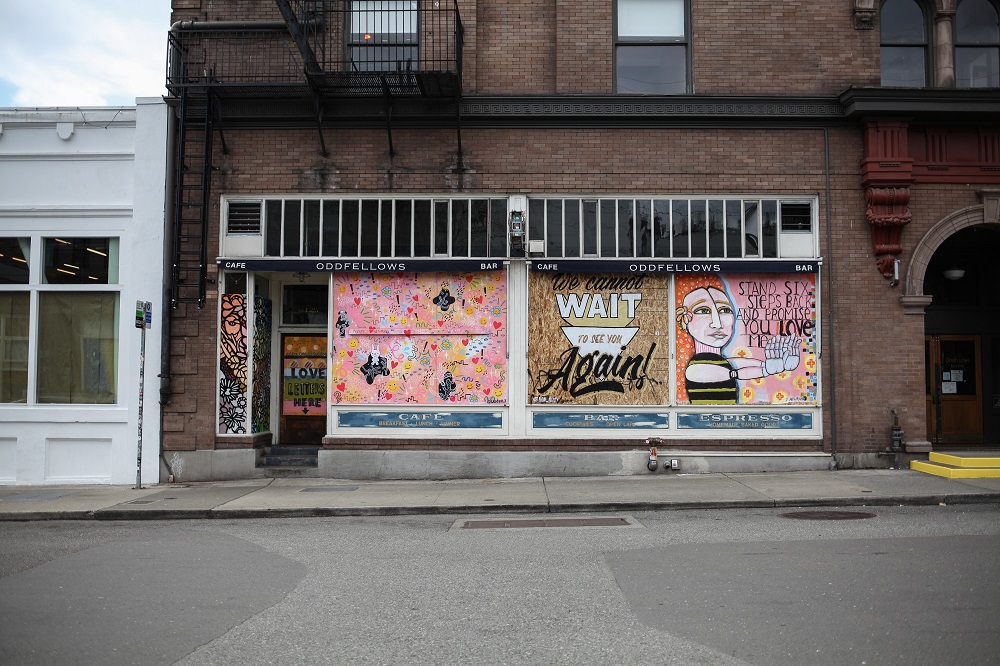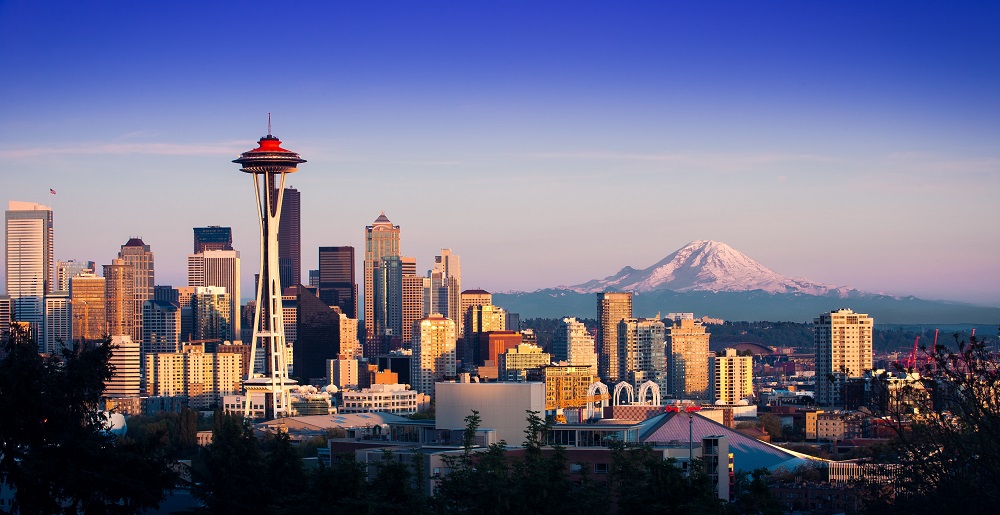How will the COVID-19 pandemic reshape Seattle? Podcasting professor weighs in
What happens when seemingly unstoppable economic growth meets an irrepressible global pandemic?
Seattle is finding out. The hard way.
To get a uniquely informed perspective on the situation as it stands—and as it may look in the future—we turn to Jeff Shulman, the Marion B. Ingersoll Professor of Marketing at the Foster School of Business. For the past four years, Shulman has examined the full range of societal and cultural ramifications of Seattle’s decade-long economic boom through his award-winning Seattle Growth Podcast and probing documentary film On The Brink.
Here’s his take on Seattle in the time of coronavirus, and beyond.
How is the pandemic impacting Seattle economically?
Jeff Shulman: Like everywhere, it’s coming in waves. The first wave crashed very suddenly and unexpectedly, hitting hourly workers, the hospitality industry, arts and entertainment. The second wave hit shortly after, when small businesses realized that even letting employees go couldn’t make up for the fact that they still have fixed expenses and little or no revenue coming in*. And the third wave—still coming—is hitting larger companies, which serve national or international customers who are also facing dire financial circumstances.
How does unemployment—or fear of unemployment—make things worse?
The Seattle Growth Podcast explored the effects of an eight-year boom, where you could spend every last dollar of your paycheck because you knew that, even if you lost your job, you’d have five new opportunities in no time. Those days are over.
So there is this economic trauma where those who are directly affected by the pandemic recession have less discretionary income to spend. And those who see people affected are deciding to save what they have rather than spend it. That lack of money trickles through the economy all the way to banks and venture capitalists who are more selective with their investments in the previously thriving startup scene. This crisis is sweeping up more and more people, and it’s going to keep going for a while.
How are those who are still able to work responding?
It is a strange situation. On one hand, coronavirus creates a live-for-the-moment perspective, because we don’t know what tomorrow will bring (and many people likely regret all the things they didn’t do in the months before the pandemic hit). The virus reminds us that life’s too short.
On the other hand, we’ve seen the uncertainty of the situation bring about a survival instinct. First it was stockpiling toilet paper and groceries, and now many people will start to stockpile savings since they do not know what tomorrow we bring.
Think of all the businesses that rely on the people of Seattle spending discretionary income. When the spending dries up, we’ve seen these businesses start to close or go through layoffs. With greater job insecurity, there is less spending. With less spending, there is greater job insecurity.
We know that Seattle is reeling from the pandemic’s economic waves #1 and #2. How is the region set up to weather wave #3?
Fortunately, Seattle is in some ways—I wouldn’t say buffered—but perhaps better equipped for this recession than other cities, for a couple reasons. The first is that we’re the cloud computing capital of the world, with Amazon and Microsoft headquartered here and Google having a big presence. So, as more workplaces become virtual, we have some of the primary companies that help businesses be more productive in these environments. Plus, people are shopping online more than ever right now, and we provide the dominant back-ends for e-commerce to operate. The second reason is that we have a very educated workforce and creative culture. With some free time and a whole new world that we’re in, you’re going to see a lot of new companies pop up in Seattle, and innovations that help tackle the challenges of this new world. That doesn’t mean that we’re not going to be hit pretty hard for a while by this.
What do you see as the forthcoming industries that are poised to trigger Seattle’s next boom?
As I mentioned, Seattle is already big into cloud computing. The next frontier seems to be artificial intelligence and machine learning. Again, Seattle companies and research institutions (including the University of Washington) are leading the development of these new technologies. There could be new money flowing into the region’s bioscience industry, where COVID-19 therapies or vaccines could be developed.
I also think there will be a boom in businesses that help individuals and companies adapt to whatever ‘new normal’ follows the COVID-19 pandemic. I wouldn’t be surprised if part of that boom happens here, where you have talented, creative people (some of whom, sadly, may have unexpected time to create during layoffs and furloughs).
What’s your prognosis for the short- and long-term?
The hard reality is that some businesses and organizations that were sewn into the fabric of Seattle are going to be ripped away from us. Many will not recover from this. That’s a real tragedy, and I’m afraid there is more tragedy to come.
But Seattle has always been a boom-and-bust town. That creative, resilient, frontier spirit is kind of built into the region’s DNA. So, these times will test us. But I also think there will be people who view these challenges as opportunity. And they will develop new ways of delivering products and services and experiences that bring us together. The same businesses and organizations may not all survive, but the collective spirit that built them will create something new in their place.
And, as Seattle has shown throughout its historic cycles of boom and bust, when it starts to build back up, it goes quickly. After the COVID-19 pandemic, the future will favor the bold. And I think the future will favor those who bet on Seattle.
A coda on the Seattle’s next boom
Would a strong response or robust rebound keep Seattle’s population growing?
Jeff Shulman: The real question is: if our companies keep growing, will they require their new employees to move to the Seattle area? Or will they allow employees to work from wherever they choose? Companies such as Amazon and Microsoft have been magnetic to talent, drawing people to Seattle from around the world. Now that employers are figuring out a way for people to effectively work remotely, maybe they continue to draw employees from around the world to their company, but without necessarily drawing them to Seattle.
Could it affect the urbanization of the region?
Seattle’s modern boom was in part a product of the ‘Great Inversion,’ in which the population that flooded toward the suburbs in the 1950s moved back to cities over the past several decades. The COVID-19 pandemic, for a number of reasons, may prove to be the cataclysmic event that changes migration. The dense, walkable urban environment that has been so desirable may become less desirable if social distancing becomes normal and fear of coming together in groups persists.
Having said that, Seattle’s mix of natural beauty, cultural amenities and vibrant energy has always drawn people to live here, and it will likely continue to do so.
* The Foster School’s Consulting and Business Development Center is providing a wide range of resources and assistance to help small businesses in Washington state—and across the United States via its Ascend network—to survive the COVID-19 crisis and rebuild over time.
2 Responses
Leave a Reply
You must be logged in to post a comment.






Hmm. This seems overly optimistic. The majority of Seattle residents could barely make ends meet before COVID-19. We may see a large outmigration of those residents during or after this. The super-heated economy of the past eight years created a plethora of social justice issues. The responsible thing for web-based companies, which can continue to work and profit during COVID-19, would be to find ways to ensure those who have service or lower-echelon jobs can afford to stay in the Seattle area.
Further, supply chain professionals have failed in the past to learn from past disasters. Everyone swore that, after Fukushima, they would diversify their sources geographically. That didn’t happen – and so, too many companies were sourcing from China, especially the Wuhan area. Will we learn this time?
I agree, I think a new realization will emerge that you cannot have sustained prosperity without taking care of everyone. The homelessness crisis was declared an emergency but addressed only halfheartedly. Now we know ho much e rely on one anther and the chain is only as strong as its weakest link. Maybe I’m too optimistic…